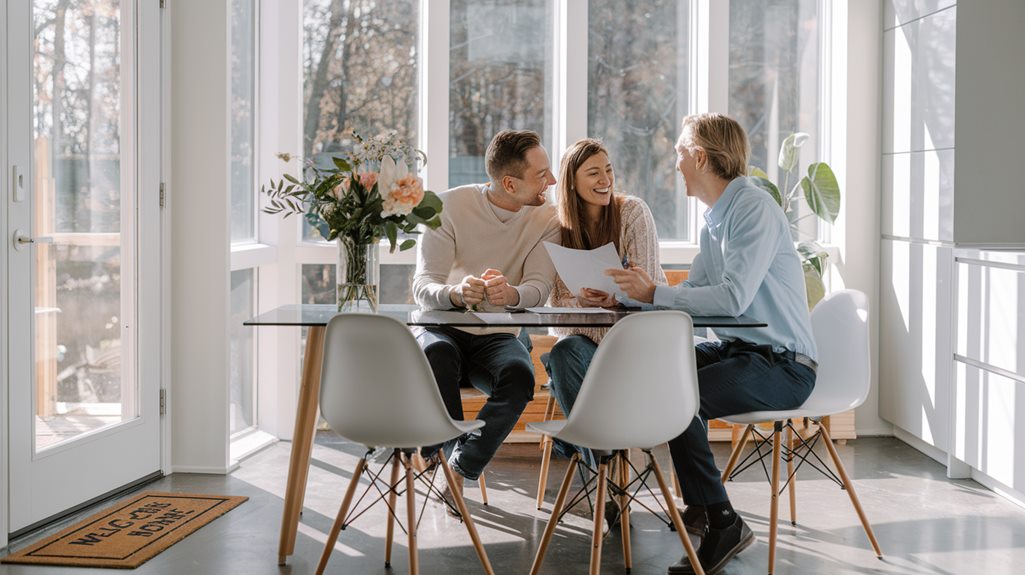Buying your first home can be exciting but also a bit tricky. Here are some important steps to help you along the way.
First, take a good look at your money. Check your credit score and how much money you owe. This will help you find the best loans.
Next, learn about different kinds of loans. Some have fixed rates, which stay the same, while others have adjustable rates that can change.
It's a great idea to find a friendly real estate agent. They can help you understand the market and will help you when it's time to make offers.
Look at different neighborhoods and think about what you want in a home that fits your life.
When you find a home you like, you'll need to make a competitive offer.
Be ready for some extra costs when you close the deal, too. By knowing these basics, you'll feel more confident and ready to buy your first home!
Ready to start building equity in your own Michigan home? Get your personalized home loan quote today.
Assess Your Financial Health

Before you start looking for a home, take a little time to check your money health. First, look at your credit score. This number is important because lenders use it to see how trustworthy you're with money. A good credit score can help you get lower interest rates, making it easier to buy a home.
Next, think about your debts. Find out how much money you owe compared to how much you make. This is called your debt-to-income ratio. It should be less than 36% for you to be in a good place to borrow money.
If you have any debts, try to pay them off. This will make you look better to lenders and help you feel more confident about your finances.
When your money situation looks good, you'll feel like you belong in the home-buying world and can be taken seriously as a buyer.
Michigan residents, unlock the door to your new home. Request your home loan quote from Treeside Financial today.
Explore Mortgage Options
Choosing a mortgage is an important part of buying a home. First, learn about fixed rates and adjustable rates. These rates will affect how much you pay each month.
You might also want to look into government loans like FHA or VA loans. They usually need a smaller down payment and have good terms. Private lenders can offer different choices, but their interest rates may change.
Start the pre-approval process. This helps you know how much money you can borrow and makes closing easier.
Think about mortgage insurance too. If your down payment is small, you might need it, and that can change how much you pay each month.
Understand Real Estate Agents

Buying a home is an exciting journey! One important step is looking at mortgage options, but it's also super important to understand what real estate agents do. These helpful people guide you when you're buying a house. They help you find properties, negotiate prices, and handle all the paperwork.
There are different types of real estate agents. A buyer's agent works just for you and helps you understand the market and what houses should cost. It's good to know how they get paid. Usually, the commission is a percentage of the sale price and is shared between the buyer's agent and the seller's agent.
Here's a simple chart to help you understand the different roles:
| Real Estate Role | What They Do | How They Get Paid |
|---|---|---|
| Buyer's Agent | Helps you buy a house | Shares commission with seller's agent |
| Seller's Agent | Helps sell a house | Shares commission with buyer's agent |
| Dual Agent | Works for both buyer and seller | Gets full commission |
| Transaction Broker | Helps with the sale fairly | Payment can be talked about |
| Referral Agent | Connects you to other agents | Gets a fee for the referral |
Make sure to find an agent who understands your needs and goals! They can make your home-buying experience much easier and more fun.
Research Neighborhoods
When you think about a neighborhood, it's important to look for things that make life better, like parks to play in, stores to shop at, and easy ways to get around.
One big thing to check is the schools. Good schools help kids learn, and they can also make homes worth more money later.
Knowing these things will help you pick a neighborhood that's right for you and your family.
Evaluate Local Amenities
Looking at local amenities is very important when you start looking for your first home. Public transportation is a big deal because it helps you get around easily. If you live near bus stops or train stations, it can save you time and make your life easier.
You should also think about community services like libraries, parks, and hospitals. These places help you feel connected and make your neighborhood a better place to live.
When you check out different neighborhoods, think about what you need and what you like. A neighborhood with good amenities can make your day-to-day life nicer and can also be a smart choice for your future.
It's important to find a home that feels right for you and is also a good investment.
Check School Districts
When you're ready to buy your first home, don't forget how important school districts are. Good schools can make a neighborhood more appealing and help your home's value go up. Schools with high ratings often mean that your home will be worth more in the future.
It's important to check the school district boundaries carefully because they can change. This can affect which school your kids go to now and later. Knowing this can help you understand how your home's value might stay strong over time.
Talk to local real estate experts. They can give you information about how well schools are doing and help you understand the housing market. This will help you make a smart choice for your investment and feel like you belong in the community.
Focus on schools, and you'll set yourself up for happiness in your new home.
Prioritize Home Features

When you're looking to buy your first home, it's really important to think about what features you want.
Make a list of the things you need right now and also what you might need in the future. This will help you find a home that works for you now and later on.
Identify Must-Have Features
Finding a home is a big adventure! To make sure you pick the right one, think about what you really need. Here are some important things to look for that will make your home comfy and a good investment:
- Energy-efficient appliances: These help you save money on bills and are good for the Earth.
- Outdoor space: Having a yard or garden is great for playing, relaxing, and enjoying nature.
- Close to shops and schools: Being near places you need, like stores and schools, makes life easier.
- Open floor plan: A home with a big, open space feels nice and lets you move around freely.
- Strong building materials: Good quality means your home will last longer and need less fixing.
Evaluate Future Needs
When you're looking for a new home, it's important to think about what you might need in the future.
Start by thinking about your family and how it might change. Will you need more rooms if your family grows? Or maybe you'll need a quiet place to work if you start working from home more often.
Look at the neighborhood too. Are there parks, schools, and stores nearby? These things can help you feel happy and connected to your community.
Also, think about how easy it will be to sell your home later. Homes that fit people's future needs can be easier to sell.
Navigate the Offer Process
Making an offer on a house can be tricky, but it's an important step to get the home you want. Here are some simple tips to help you stand out and make a good offer:
- Look at similar homes: Find out how much other homes like yours have sold for in the area.
- Talk to your agent: Your agent knows a lot about buying homes. They can help you make a strong offer.
- Think about special conditions: These are things like needing time to sell your old house. You want to protect yourself but also be a good choice for the seller.
- Be open to changes: Sometimes you might need to change things like when to close or fix something in the house. Being flexible can help.
- Be clear in your communication: Let the seller know what you want. This builds trust and makes everything smoother.
Prepare for Closing Costs

When you're ready to buy a home, it's important to know about closing costs. These are the extra fees you have to pay when you finish buying the house. Some of these costs include lender fees, title insurance, appraisal fees, and escrow deposits.
They usually add up to about 2% to 5% of the price of the home.
To avoid surprises, it's smart to save some money just for these costs. Talk to your real estate agent and mortgage lender. They can help you find ways to save money and make the process easier for you.







